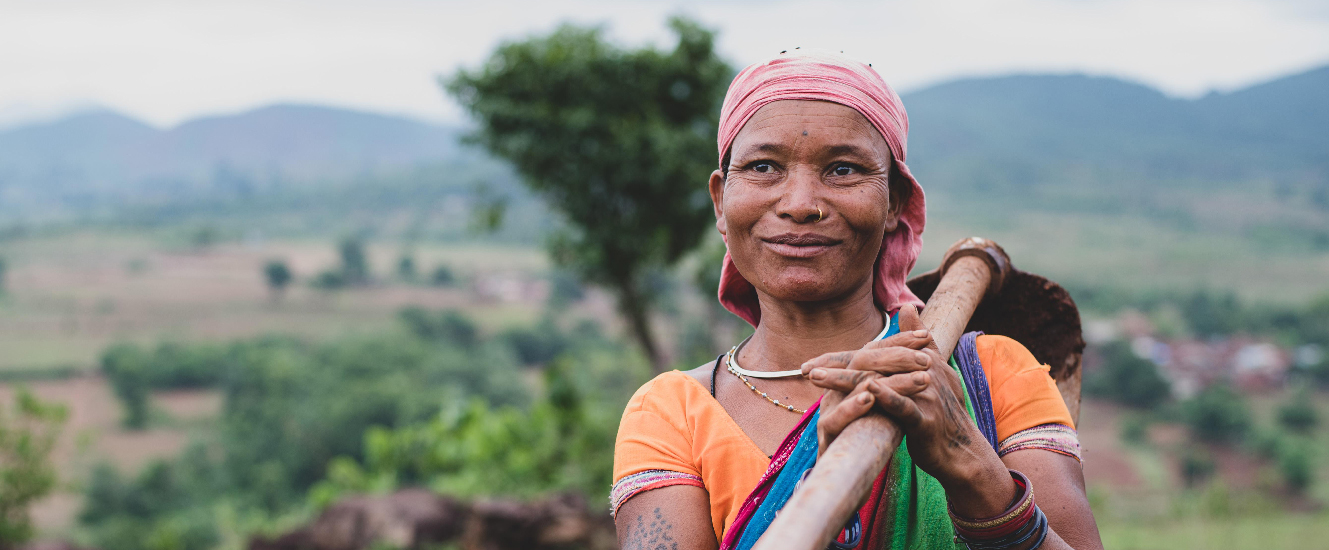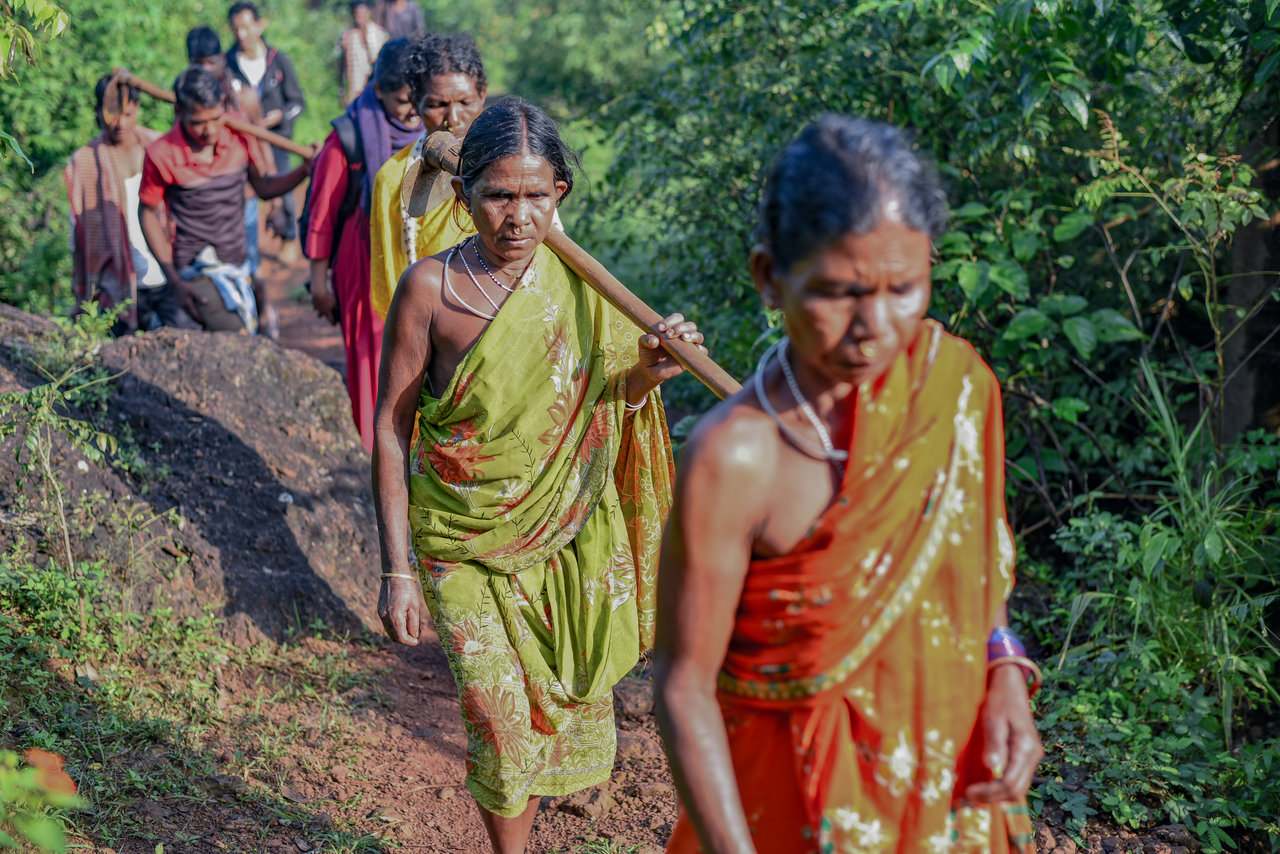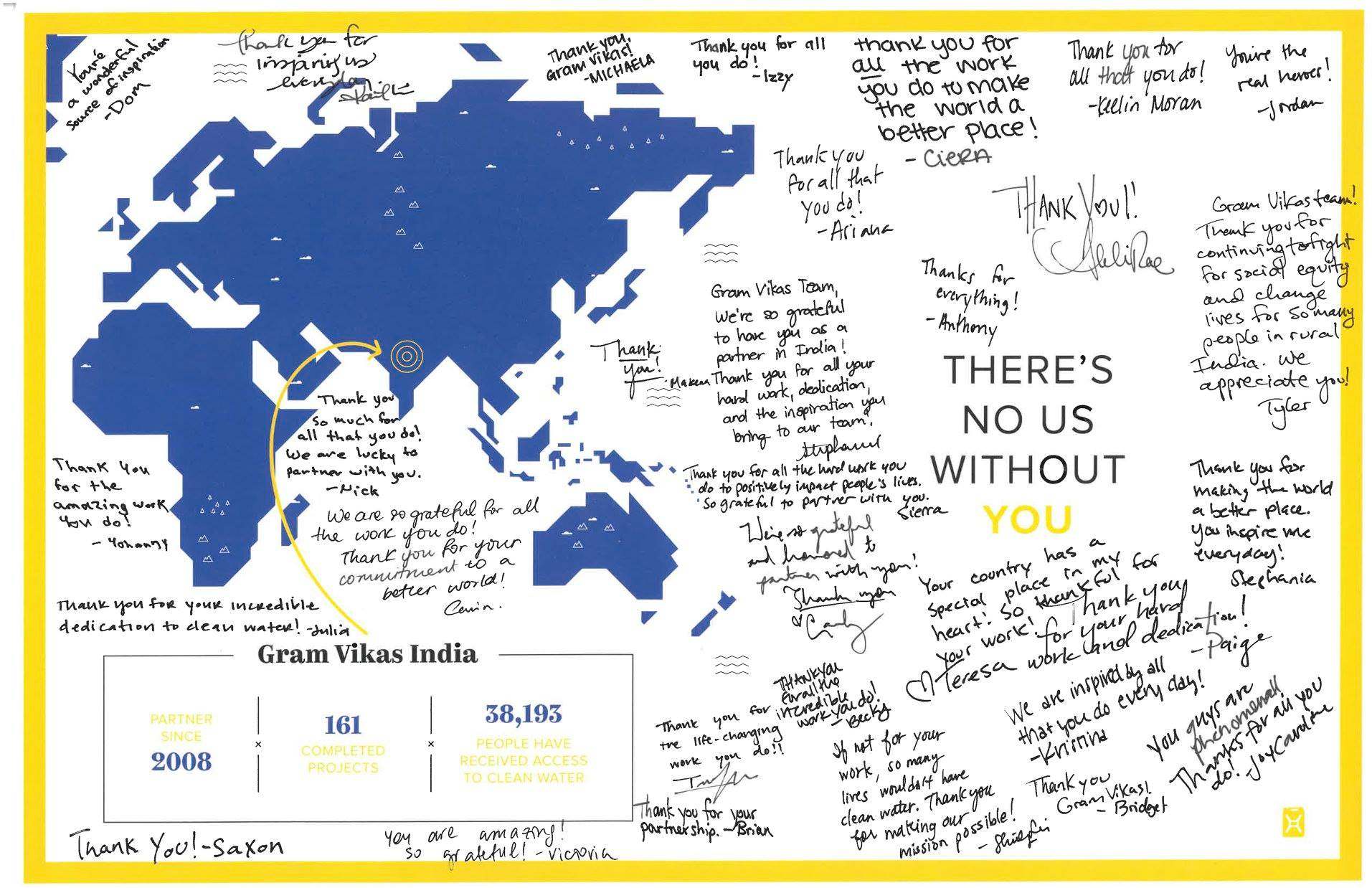A snapshot of Gram Vikas’ 40th year
FeatureBy Liby Johnson
30 September 2019

Hitadei Majhi as she walks up the hill to till the land for plantations that will protect and nourish water sources for sustainability. In Nuapada village, Kalahandi district, Odisha. Photograph by Ajaya Behera.
Gram Vikas completed a landmark of 40 years of work, in partnership with rural communities, across Odisha, Jharkhand and other states in 2019. We used the cluster-level celebrations, marking GramVikas@40, to connect with our partner village communities and other stakeholders, and reaffirm our commitment and resolve to take the journey forward. Past and current members of the Governing Board, former colleagues and volunteers, and well-wishers; the staff of Gram Vikas, teachers and students from the Gram Vikas residential schools came together at the celebrations at Mohuda in January 2019.
Overcoming Cyclone Titli together with partner communities
Cyclone Titli made a landfall, near Palasa, in neighbouring Srikakulam district of Andhra Pradesh, on 11 October 2018. It gathered speed and strength after the landfall causing unprecedented rainfall and winds in the Mahendragiri mountain range of Gajapati and Ganjam districts. The resultant landslides killed more than 50 persons and caused widespread destruction of property. The cyclone severely affected our partner communities in Rayagada, Gumma and Gosani blocks of Ganjam district. Our campuses in Koinpur, Karadasing and Tumba endured severe damage.
Colleagues at Gram Vikas responded with great alacrity, mobilising immediate relief supplies from Bhubaneswar, and were the first people from outside the area to reach out to some of the most affected villages. Since then, we have continued to work with the communities, helping them rebuild through technical and handholding support and resource mobilisation.
Status Assessment Survey starts
The Status Assessment Survey (SAS), of about 70,000 households across 1170 villages, rolled out in May 2018. An exercise with few parallels, the survey aims to help Gram Vikas re-establish contact with all the villages we have worked with, assess the status of the infrastructure, governance processes and gaps, and gauge the interest of the villages to continue the partnership. About 50 young men and women, from villages that Gram Vikas has worked with in the past, were selected and trained for carrying out the survey. It is a matter of great pride for us that 29 of these volunteers will be joining as full-time employees of Gram Vikas in April 2019.

Tribal women on their way to work in the forest in Kalahandi district. Photograph by Ajaya Behera.
Decade V framework to shape our work
We finalised the Gram Vikas Decade V Strategic Direction and Programme Framework that will shape our work in the new decade. The Decade V framework will guide all plans and activities taken up from April 2019. The process for the first annual plan (for 2019-20) under the new framework began with field-level consultations in February 2019.
Experiments in new streams of work and approaches marked the year 2018 – 19 for Gram Vikas. We developed and piloted initiatives in Water Quality Management, Water Source Sustainability and Deepening and Integrating Water, Sanitation and Hygiene for better nutrition and health outcomes (WASH+) to consolidate our work in the areas of Water and Sanitation. The Smart Community Interface project, in the area of Habitat & Technologies, built information technology platforms for enabling information and communication services to remote villages.
The School Sanitation Project, which began on April 2018, in Nayagarh, Ganjam and Kalahandi districts achieved substantial progress but could not complete the 100 school toilet units by March 2019 as was planned. We expect to handover all the units by June 2019.
We resumed our work on mobilising communities to obtain their rights under the Forest Rights Act. With the support of Vasundhara and other civil society partners, we took up work in about 125 forest/forest fringe villages in Ganjam and Gajapati districts. Activities continued under the Holistic Rural Development Programme in Nayagarh and the Odisha Tribal Empowerment and Livelihood Programme in Kalahandi districts
Continuing and forming valued partnerships
Our partnerships continued with HDFC Bank, Mahanadi Coalfields and Tata Sponge Iron Limited; Rourkela Steel Plant and the State Bank of India Foundation for the SBI-Youth for India Fellowship. The Oracle support, through Charities Aid Foundation, will move into the fifth year starting April 2019.
We resumed our partnership with Charity: Water, USA. We found a new partner in the InterGlobe Foundation, Gurgaon. Our partnership with the IBM Corporate Service Corps programme brought on board IBM consultants, whose expert inputs helped to strengthen several internal systems.
The partnership with PRADAN, under the Bill and Melinda Gates Foundation, supported PoWER Project, and with the Odisha Power Generation Corporation in Telenpalli GP of Jharsuguda district came to a successful closure during the year.
We are thankful to the Government of Odisha for continuing to see value in partnering with us. A word of gratitude to the knowledge partners (academic and research institutions) from across the globe, who seek our partnership as a win-win for furthering the knowledge base.

Strengthening systems and processes
We began the process of restructuring the management and implementation systems within Gram Vikas. The field-level work is now organised into six geographical clusters, each consisting of one or more districts. Each such cluster is now led by a Cluster Manager. The Gram Vikas projects in a cluster of villages, where intensive work takes place, now report to the Cluster Managers.
The reorganised Management Team with the purpose to bring about a collegial method of functioning at the top management level will help in pooling expertise and perspectives to make programme planning and implementation stronger. Addition of new members strengthened the team, which is now organised into groups managing programmes/functions with responsibility for the focus areas under the GV Decade V framework.
Several steps taken during the previous year to strengthen internal systems and processes continued during this year. We strengthened our accounting and financial reporting systems with better use of technology. Manuals and guidelines for internal processes were revised and published, including the Procurement Manual and Employees Manual.
The Urna personnel management application on the Android platform was rolled out across Gram Vikas. All employees use this application for attendance, leave and tour approvals. This has reduced the time and effort required to compile monthly attendance records that form the basis of payroll.
The Performance Management System was rolled out. For the first time, Gram Vikas employees prepared Annual Performance Plans with clear result areas and performance indicators, which will form the basis for evaluations. Supplementing these improvements, the Staff Development Cell planned and executed a wide range of capacity development efforts.
We invested resources and efforts during the year to sharpen our strategic communications. The Gram Vikas website (www.gramvikas.org) underwent a complete makeover informed by an extensive user and audience research and feedback. Our presence in the Social Media was strengthened, with a wider range of content being posted on Facebook, Instagram, LinkedIn and Twitter.
Welcoming new members to the Governing Board
The Governing Board of Gram Vikas continues to be the anchor and force, as we negotiate the changes in the external environment and make internal improvements. The addition of four new members – each with substantial experience in her/his respective areas – strengthened the Board. I wish to record my sincere gratitude for the guidance and support provided by the Chairman and Members of the Gram Vikas Governing Board.
I wish to thank all our collaborators and partners, particularly those who have been supporting us with financial resources and who stood behind us as solid support during the year.
A summary version of the report here.
The complete report is available for download here.
Photograph by Ajaya Behera
ACKNOWLEDGEMENT
Gram Vikas Executive Director gives an overview of the work done in the past year.
ABOUT THE AUTHOR
Liby Johnson is the Executive Director of Gram Vikas.
RELATED BLOGPOSTS
Odisha villages voice 7,648 demands as local governance listens
Villages in Odisha lead community planning processes to track progress, revise priorities, and align local needs with Gram Panchayat action.
Rediscovering the nutritional power of Wild Edible Plants with the Saura Adivasis
An SBI Youth for India Fellow works with the Saura Adivasis by reviving their knowledge of wild edible plants, promoting a micronutrient-rich diet and strengthening their connection to traditional food sources.
A remote Adivasi village takes steps to ease water stress through efficient groundwater management
A community-led approach ensures water security, sustaining life in harmony with the environment.